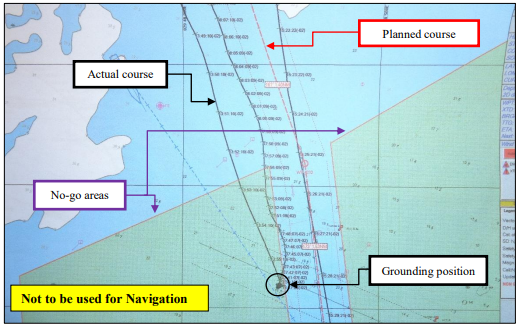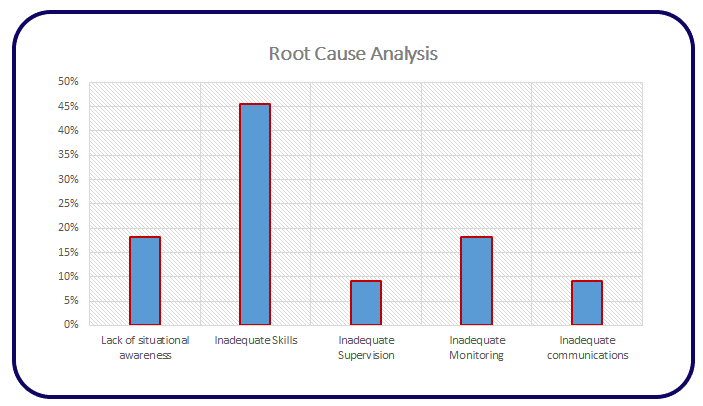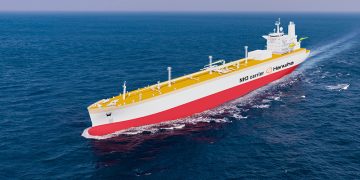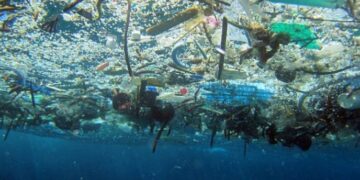A series of causes contributed to the following vessel grounding; the safety investigation revealed that the course recommended by the pilot was different from the one prepared in the passage planning. Moreover, during navigation in El Dekheila Channel (Egypt), the vessel navigated close to shallow areas, and subsequently ran aground and remained stranded.
The incident
On November 2016, during daylight time, a Bulk carrier ran aground and remained stranded in the entrance of El Dekheila Channel, Egypt. The vessel had completed her sea passage fully loaded with a draught of 17.5 m. In respect of draught, the ship was planned to enter the port from the buoyed channel. A detailed passage plan was prepared on ECDIS including the planned track, safety contour and safety depth as required and no go areas in accordance with ship’s size and draught. Two pilots had boarded the vessel and proceeded to the bridge where the master, third mate and a helmsman were already in the wheelhouse.
The information exchanged was typical and the Master Pilot information exchange not followed as per Safety Management System. The Inbound pilot assumed the con in order to navigate the ship in the channel.
The vessel was proceeding towards the entrance of El Dekheila Channel, following course alternations recommended by the pilot. The pilot’s orders were given directly to the helmsman. Although the Master was on bridge supported by an officer, there were no checks conducted to verify ship’s position in relation with the planned track.
Additionally, as revealed later, the off-course alarm on ECDIS was de activated in order to reduce the sound level within the bridge during pilotage. The No Go areas were not taken into consideration by the pilot and no other of the bridge team interfered or made a comment / recommendation on the progress of the ship over ground and the planned track.

Key Findings
- Evidence indicated that an adequate passage plan had been prepared and integrated in the ECDIS
- Although an adequate passage plan had been prepared and uploaded on ECDIS, the planned approach to the channel was not implemented;
- The master and the navigational OOW accepted pilot’s advice, even if it deviated from the agreed passage plan;
- The presence of two pilots rather than one may have convinced the master that after all, they had better control over the evolving situation;
- Open and clear communication of risk between the bridge team members was missing;
- The pilots took decision without any form of verification – possibly also because they were confident that the ship was outside any hazardous areas;
- Although the vessel’s deviation from her intended course was seen by the master as a risk that he had to communicate to the pilots, no action was taken;
- The fact that the pilots sounded confident, unconcerned and that they were in good control of the situation, prevented a thorough technical discussion with other bridge team members;
- The deviation of the vessel’s course also meant that uncertainty was introduced and the vessel’s exposure to hazards had increased;
- The crew members forming part of the bridge team did not have access to information on the developing risk;
- The deactivation of the off-course alarm (i.e.,the sound of a physical buzzer) did not help to reinforce the master’s concern that the vessel was off-course;
- The persons on the bridge had inaccurate knowledge of the situation;
Identified Root causes
Taking into consideration the findings the following root causes seem to led to the accident.
From ship’s side
- Company’s SMS regarding Master Pilot exchange was not followed (Inadequate Skills)
- Bridge resource management procedures during pilotage were not followed (Inadequate Skills)
- Company’s instructions for ECDIS alarms’ management were not followed (Inadequate Skills)
- The bridge team did not monitor the deviation of the planned track (Inadequate Monitoring)
- The Master did not act as the overall responsible of Ship’s safety, but remained silent during the pilotage and the direct orders given to bridge team by the pilot. (Inadequate Supervision)
- The bridge team did not realize the hazards occurred due to off planned track navigation in a restricted area. (Lack of situational Awareness)
From pilot’s Side
- Pilot followed a track which was neither pre-planned nor discussed with the Master (Inadequate Skills)
- Pilot proceeded to a channel without taking into consideration the no go areas and draught hazards as identified by the bridge team (Inadequate Skills)
- Pilot conducted the pilotage without requesting assistance from the Master, giving directly orders to the helmsman. (Inadequate Communication)
- Pilot did not conduct any kind of verification of ship’s position in relation to planned course. Additionally, he did not verify that the ECDIS off course alarm was activated in order to have at least a brief time margin to react in case of danger. (Inadequate Monitoring)
- The pilot did not realize the hazard of steer the ship off planned track and did not cooperate with the bridge team. (Lack of Situational Awareness)

Lessons Learned
- The safest way to navigate a ship is to follow a well-prepared passage plan, appraised and approved by Master.
- Pilotage requires team work; it is not one man’s show. In particular, a Pilot should become part of the bridge team with the aim to assist with his/her knowledge about the area and all related procedures.
- SMS procedures give guidance based on identified hazards and lesson learned, therefore they must be followed at any case.
- ECDIS is a critical tool of safe navigation accompanied with good alarm management to avoid the so called ‘alarm fatigue’.






























































Lesson learned to be added: the ultimate responsibility for the ship rests in the Master, not in the Pilot!